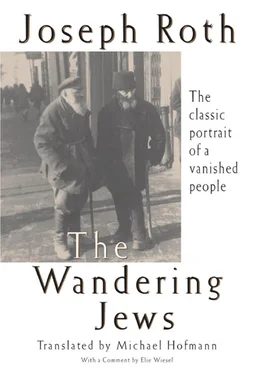†The Wailing Wall in Jerusalem.
‡Now Kaunas, in Lithuania.
§Hayyim Bialik (1873–1934).
¶A play on the German proverb wie Gott in Frankreich , meaning “to live well” or “off the fat of the land.”
#Radziejow.
**Ashkenazi melody for the Day of Atonement, popularized by Max Bruch’s cello variations of 1880.
††The later — former — Yugoslavia.
‡‡Admiral Horthy, conservative leader who came to power in Hungary after World War One and ruled until 1944.
A J EW E MIGRATES TO A MERICA

1.
Even now, and even though the quotas for immigrants from Eastern Europe have been regularly exceeded, and even though American consulates want to see more papers than any consulate on earth, even now, many Eastern Jews emigrate to America.
America signifies distance. America signifies freedom. There is always some relative or other living in America. It is rare to find a Jewish family in the East that doesn’t have an uncle or cousin in America. Somebody emigrated, twenty years ago, say. He fled the draft. Or he received his call-up papers and deserted.
If Eastern Jews weren’t quite so timorous, they could take justifiable pride in being the most antimilitaristic people in the world. For a long time they were held by their fatherlands, Russia or Austria, to be unworthy of doing military service. Only when the Jews were accorded equal rights did they have to enlist. It was less a matter of equal rights than equal obligations. Up to that point only the civilian authorities had harrassed the Jews, but now they were exposed to the malignity of the military authorities as well. The Jews bore the slur of not having to fight with great joy. When they were accorded the signal honor of being permitted to fight, drill, and lay down their lives, they were plunged into gloom. Anyone who was approaching his twentieth year and was sufficiently able-bodied to assume that he would be called up fled to America. Whoever could not afford it, mutilated himself. There was a regular epidemic of self-mutilation among Jews in the dec ades leading up to the War. Their fear of military life induced them to hack off a finger, sever the tendons in their feet, pour corrosives into their eyes. They became heroic cripples, blind, halt, hunchbacked, they subjected themselves to the most lasting and painful disfigurements. They did not want to serve. They did not want to go to war and lose their lives. Their brains were always alert and calculating. Their brains worked out that it is better to live as a cripple than to leave a healthy corpse. Their faith supported their logic. Not only was it stupid to die on behalf of some kaiser or czar or other, it was also a sin to live far from the Torah and in opposition to its teachings. It was a sin to eat pig meat. To bear arms on the Sabbath. To drill. To raise a hand, never mind a sword, against a stranger who has done them no harm. The Eastern Jews were the most heroic of pacifists. They were martyrs for pacifism. They chose crippledom. No one has yet celebrated the heroism of these Jews.
“The commission’s on its way!” ran the terror-filled refrain. It referred to the commission of medical examiners that traveled around the shtetls to conscript soldiers. Weeks before, the “torments” had begun. The young Jews tormented themselves to become weak, to cultivate some cardiac irregularity. They didn’t sleep, they smoked, they walked, they ran, they were licentious in the service of piety.
Just in case they bribed the army surgeons as well. The chosen middlemen were officials and former army surgeons who had had to quit the service over some shenanigans. Entire tribes of military doctors grew rich, left the army, and went into private practice, part of which consisted in the passing on of bribes.
If you had money you thought about whether you would try bribery or emigrate to America. The courageous ones went to America. They would never come back. They renounced. With a heavy heart they renounced family and with a joyful heart the fatherland.
They went to America.
2.
Today these are the fabled cousins of the Eastern Jews. The onetime deserters have become rich, or at least well-to-do, in the new country. The old Jewish God was with them. He rewarded them for their antimilitarism.
The American cousin is the last hope of every Eastern Jewish family. It’s a long time since he last wrote, this cousin. All that’s known of him for certain is that he’s married and has children. There’s an ancient faded photograph of him on the wall. It’s been there for the best part of twenty years. It arrived with a ten-dollar bill. Then nothing for the longest time. Even so, the family, back in Dubno, are in no doubt that they’ll be able to find him in New York or in Chicago. Of course his name will have become less Jewish, he’ll speak English, be an American citizen, wear comfortable suits with baggy pants and padded shoulders. But all the same they will manage to recognize him. Their visit may well be disagreeable to him. But he certainly won’t throw them out, for they’re kin.
And then one day, while they’re thinking about him in these terms, the postman will come with a fat registered letter. The letter will contain dollars, questions, wishes, and greetings, and it will promise: “Steamer ticket to follow.”
From that moment on they’re “going to America.” The seasons change, the months relieve one another, a year elapses, there’s nothing more about any steamship ticket, but they’re “going to America.” The whole shtetl knows it, the surrounding villages know it, the neighboring shtetls know it.
A stranger comes along and asks: “What’s Yitzhak Meyer doing?” “He’s going to America,” the locals will reply; all the while, yesterday and today and tomorrow and the next day, Yitzhak Meyer will be going about his business, and nothing in his home will be any different.
In reality, though, a great deal will be different. He is getting ready. He is getting ready for America. Already he knows exactly what he will take with him and keep, and what he will leave behind and sell. He knows what he wants to do with the quarter of a house that is registered in his name. He inherited a quarter of a house once. The other three-quarters of it belonged to three relations. They’ve since died or emigrated. Now the other threequarters belong to a stranger. He could sell him the last remaining quarter, but he wouldn’t get much for it. Who else in the world would buy a quarter of a house? So, if it’s unmortgaged, he will try and borrow as much as he can on it. After a while he succeeds. He has cash or bills of exchange that are almost as good as cash.
The Jew who intends to go to America doesn’t start learning English, as you might have supposed. He already knows how he’s going to get along in the new country. He speaks Yiddish, the most widely used language in the world — in terms of geography, not the number of those who speak it. He will make himself understood. He doesn’t need to understand English. There are Jews who have lived in the Jewish quarter of New York for thirty years, and they still speak Yiddish and can’t understand their own grandchildren.
So he already knows the language of the other country. It is his own mother tongue. And he has money. All he needs now is courage.
It’s not America that frightens him, it’s the ocean. He is well used to crossing large expanses of land, but never water. Once, when his forefathers were given a sea to cross, a miracle happened, and the waves parted. If an ocean separates him from his homeland, it’s like an eternity. The Eastern Jew is afraid of ships. He doesn’t trust them. For centuries he has been living in the interior. The steppes, the limitlessness of the flat land, these hold no terrors for him. What frightens him is disorientation. He is accustomed to turning three times a day toward Misrach , the East. It is more than a religious imperative. It is the deeply felt need to know where he is. To know his location. It is easiest to find one’s way and to know God’s way from the certainty of a geographical location. He knows more or less which way Palestine lies.
Читать дальше













